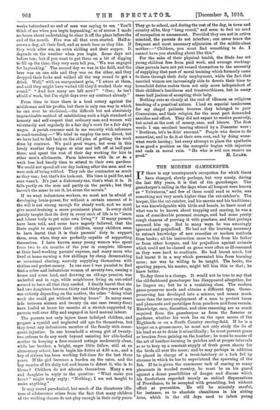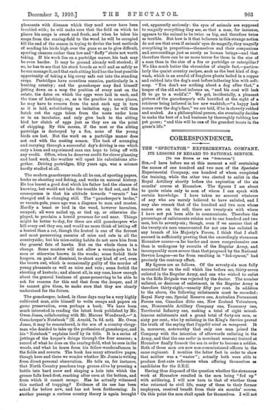THE1 MODERN GAMEKEEPER.
IF there is any countryman's occupation for which times have changed, slowly perhaps, but very surely, during the last fifty years, it is that of the gamekeeper. The gamekeeper's calling in the days when all keepers were known as "Velveteens," and few of them could read or write, was something not very much higher than the rat-catcher's. The keeper, like the rat-catcher, had his secrets and his traditions; he was knowledgeable with birds and beasts, he knew most of what was to be known about trapping and snaring, be was a man of considerable personal courage, and had some pretty rough chances of proving it with poachers, and that perhaps summed him up. But in many ways be was amazingly ignorant and prejudiced. He had not the learning necessary to extract knowledge of new remedies or modern methods from books ; all his instruction came to him from his father or from other keepers, and his prejudices against animals which could not be classed as game were often as ill-reasoned as they were hard to eradicate. He had learnt much, but had learnt it in a way which prevented him from learning more; nor was he willing to be taught. The books, the sporting papers, his master, might tell him this or that ; he knew better.
To-day there is a change. It would not be true to say that the old-fashioned gamekeeper has disappeared altogether, for he lingers on; but he is a vanishing class. The modern game-preserver needs and obtains a different type. Game- preserving has developed into a science, and means much more than the mere employment of a man to protect hares and pheasants and partridges from poachers and from vermin. Knowledge, care, discretion, and close reasoning are as much required from the gamekeeper as from the forester or gardener, whether his work lies on the open moors of the Highlands or on a South Country rearing-field. If he is a keeper on a grouse-moor, he must not only study the lie of his land so as to drain it scientifically ; he must prevent grass or bracken from gaining on the heather; be must be master of the art of heather-burning in patches and at proper intervals so as to keep up a constant supply of fresh green shoots for the birds all over the moor; and be may perhaps in addition be placed in charge of a trout-hatchery or a loch fed by streams in which he has to superintend the spawning of the fish. If he is given the commoner task of rearing so many pheasants in wooded country, he must be on his guard against a dozen possibilities of danger and disease which his forefathers regarded merely as unkind dispensations of Providence, to be accepted with grumbling, but without effort at prevention. He will be minutely careful, for instance, as to absolute cleanliness in his sitting hens, which in the old days used to infect young
pheasants with diseases which they need never have been troubled with ; he will make sure that the field on which he places his coops is sweet and fresh, and when he takes his coops from the rearing-field to the wood he will be occupied till the end of the season in trying to devise the best methods of sending his birds high over the guns so as to give difficult, sporting chances rather than low and" fluffy" shots not worth taking. If his work lies on a partridge manor, his task may be even harder. It may be ground already well stocked; if so, he has to see that his stock breeds as well and as safely as be can manage it, and that each sitting bird has the best possible opportunity of taking a big covey safe out into the standing crops. Partridges have countless enemies, particularly in a bunting country ; and the gamekeeper may find himself jotting down on a map the position of every nest on the estate, the dates: on which the eggs were laid in each, and the time of hatching ; or, as is the practice in some places, he may have to remove from the nest each egg in turn as it is laid, substituting an imitation egg ; he will then hatch out the eggs taken from the nests under hens or in an incubator, and only give back to the sitting bird her clutch of eggs just as they are on the point of chipping. By this means, if the nest or the sitting partridge is destroyed by a fox, none of the young birds are lost. But the work on a partridge manor does not end with the nesting season. The task of arranging and carrying through a successful day's driving is one which only a keen and experienced man can hope to bring off with any credit. Often, when he deserves credit for clever planning and hard work, the weather will upset his calculations alto- gether. Driving partridges, fifty years ago, was a science hardly studied at all.
The modern gamekeeper reads all he can, of sporting papers, books on shooting and fishing, and works on natural history. He has learnt a good deal which his father had the chance of knowing, but would not take the trouble to find out, and the consequence is that his attitude towards " vermin " has changed and is changing still. The "gamekeeper's larder," or vermin-pole, years ago was a disgrace to man and master. Hardly a beast or bird in the wood, however harmless, escaped; all were nailed up, or tied up, or otherwise dis- played, to proclaim a horrid presence far and near. Things might be better to-day, for there are still gamekeepers who kill every owl they see, and would no more think of letting off a kestrel than a rat, though the kestrel is one of the fiercest and most persevering enemies of mice and rats in all the countryside; but his mice-eating habits do not save him from the general fate of hawks. But on the whole there is a change. Some masters will not allow a vermin-pole to be seen or otherwise known in the woods; some forbid their keepers, on pain of dismissal, to shoot any kind of owl, even the brown owl, which is occasionally guilty of the murder of young pheasants as well as mice and rats ; some forbid the shooting of kestrels ; and almost all, in any case, know enough about the general business of game-preserving to be able to ask for reasons for this and that from the ,keeper, and if he cannot give them, to make sure that they are clearly understood for the future.
The gamekeeper, indeed, in these days may be a very highly cultivated man, able himself to write essays and papers on game preservation, even perhaps a book. We have been much interested in reading the latest book published by Mr. Owen Jones, collaborating with Mr. Marcus Woodward,—" A Gamekeeper's Notebook" (E. Arnold, 7s. 6d. net). Mr. Owen Jones, it may be remembered, is the son of a country clergy- man who deaided to take up the profession of gamekeeper, and his "Notebook" explains itself by its title. It is a series of jottings of the keeper's doings through the four seasons ; a record of what he does on the rearing-field, what he sees in the woods, and what he hears from his fellow-woodcraftsmen in the fields and coverts. The book has many attractive pages, though here and there we wonder whether Mr. Jones is writing from direct personal observation. He tells us, for instance, that North Country poachers trap grouse alive by pressing a bottle into hard snow and shaping a hole into which the grouse falls head-first, reaching after corn at the bottom, and from which it cannot escape. Has he actually witnessed this method of trapping ? Evidence of its use has been asked for before now, and has not been forthcoming. In another passage a curious country theory is again brought out, apparently seriously : the eyes of animals are supposed to magnify everything they see, so that a man, for instance, appears to the animal to be twice as big, and therefore twice as terrible. But how is it that believers in this strange notion do not see that even if animals' eyes do magnify, they magnify everything in proportion—themselves and their companions and surroundings just as surely as human beings—and that therefore there can be no more terror for them in the size of a man than in the size of a fox or partridge or caterpillar ? We like much better the chronicles of simple fact, —particu- larly the quaint country recipes, such as the best kind of dog- wash, which is an armful of foxglove plants boiled in a copper and rubbed into the dog's coat before lathering him with soft- soap. "You don't see nothing about a dog after that," a keeper of the old school informs us, "and his coat will look fit to go to a wedd'n'." We get, incidentally, a pleasant picture of the gamekeeper's wife horrified at the sight of a retriever being lathered in her new washtub,—" a happy look comes over the dog's face," we are told, if be is cleverly rubbed and soaked. As a philosophical person, she eventually decides to make the best of a bad business by thoroughly tubbing her pet goose; "and this will be one of the grandest treats in the goose's life."











































































 Previous page
Previous page